
Individuals and Businesses can now avail priority sector loans from banks to buy solar power generators and other non-conventional energy products
RBI issued a Master Circular in which among others agriculture and micro and small enterprises formed a part of priority lending sectors.
Availing a loan for acquiring an asset is a legitimate activity for individuals as well as businesses. Banks and financial institutions such as NBFCs offer loans for a variety of purposes. Different types of loans include home loans, car loans, education loans, personal loans, consumer loans and business loans. Business loans include term loans, working capital loans and machinery loans among others.
From time to time, lenders offer special schemes to motivate businesspersons and individuals to apply for loans to meet specific requirements. Often, the government also comes up with schemes to promote a specific activity. One such activity pertains to priority lending for which the RBI issued a Master Circular in which among others agriculture and micro and small enterprises formed a part of priority lending sectors.
Subsequent to the release of this circular, the RBI enlarged the scope to include social infrastructure and renewable energy also under priority lending.
Based on the RBI guidelines let’s take a look at the ways in which businesses and individuals can benefit from the priority sector lending program of the government.
Businesses
Businesses that want to procure renewable energy based power generators or non-conventional energy based products can avail priority sector loans subject to the guidelines issued by the RBI and the banks concerned. Products included in this category are as follows:
- Solar-based power generators
- Biomass-based power generators
- Windmills
- Micro-hydel plants
- Remote village electrification – street lighting and other requirements
Business owners wanting to install solar-based power generators can avail priority sector loans from banks. The maximum amount of loan that can be sanctioned under the scheme is Rs 15 crore subject to compliance with guidelines issued by RBI.
Individuals could also qualify for the priority sector loans for the purchase of solar based power generators for their own use. However, the maximum amount of loan that can be sanctioned under the scheme is Rs 10 lakh per borrower subject to complying with guidelines issued by RBI.
How priority sector loan helps
The RBI does not lay down any preferential rate of interest for priority sector loans. However, the benefit is in the form of priority sector loan targets set for the banks. As per the present policy, banks need to advance 40 per cent of Adjusted Net Bank Credit or Credit Equivalent Amount of Off-Balance Sheet Exposure, whichever is higher, to priority sectors. Within this overall target of 40 per cent, targets of 18 per cent for agriculture, 7.5 per cent for micro-enterprises and 10 per cent for weaker sections are also earmarked. The rest 4.5 per cent applies to other priority sectors which include renewable energy products, solar powered electric generators, etc. However, any business or individual can qualify over and above the 4.5 per cent and within 40 per cent if they qualify under other categories.
Role of NBFCs
As per RBI directives, banks can tie up with NBFCs to co-originate loans for the creation of priority sector assets subject to direct exposure of minimum 20 per cent of the credit risk on NBFC’s books and balance on the bank’s books till the date of maturity. Thus, individuals and businesspersons can take advantage of the new guidelines and benefit from a wider choice of lending institutions.














